More of her life
She was an eyewitness to the Battle of Honey Springs that occurred near her home in the summer of 1864. Honey Springs was down "the road" (the main, big dirt road her master took to trade corn and get clothing) to the closest trade town. By this time, Tuskaya-hiniha was blind, and most of his slaves had runoff. One morning, before the sun rose, Lucinda was with the baby boy pushing him on the swing, and a man on a horse ran over the hill calling the battle cry to warn all of what was coming. Tuskaya-hiniha heard it, and the family (including Lucinda and the remaining slaves) quickly readied the important necessities—meats, pots, corn, and blankets—which they loaded into a wagon and went on their way. The rainy weather was not helpful as it resulted in mud and the family had to pull off and wait it out. While they waited, Confederate soldiers passed their way with big guns. The Yankees burned down most of Honey Springs. The night passed with the lullaby of gunfire, and then they headed back home the next day. Upon arrival, they found their chickens and hogs were undisturbed and everything else to be fine; apparently, the soldiers had no time to take a thing.
The war wasn't over yet, and the family packed up and moved on to be out of danger. The road was filled with wagons, and the rain began once again. The wagons traveled in packs, and when one pack ran into the other because of the muddy, rutted road, the people would put all the horses and mules together and pull the wagon out. Not only was the road muddy, but it was rutted in a bad way from the trampling of many marching soldiers. During the nights, there would be group meals; all the women and slaves gathered and cooked the food in large pots. The men were so worn-out and hungry that by the time they were through eating, there wasn't any food left for the women and slaves.
The family traveled north, and Canada became the destination. They arrived, but there were no free houses or hospitalities that weren't already taken up by the soldiers; there weren't enough for the soldiers. Some soldiers camped out, and the Indians camped near them. Lucinda did not learn any English until after the war; all she knew was the Creek language. The soldiers were singing and Lucinda did not know what about it, so she asked one of the elders. He replied, "I wish I was in Dixie, look away, away." Lucinda then asked, "Where's Dixie?" The old Indian laughed and talked to the soldiers, who also laughed, and Lucinda was told no more.
The following day of their travels brought them to a big river raised from all the previous rain. Lucinda had never seen so much water. The men got some boats to put materials in, then floated the wagons across with the mules and horses swimming alongside; Lucinda thought they would be drowned because she had never experienced such a crossing.
The place they came to had many vacant homes, probably because many people left on account of the war. The Indian soldiers would quit the army and run away in groups, raiding houses as they went, taking everything they saw and killing any in their way. The families who Lucinda was with would always send scouters to look at the home to see if it were vacant and livable, but mainly because it was liable that there was already a scout of someone else's in there. Some houses had fresh graves. They didn't stay there. One house, Tuskaya-hiniha's wife peeked in, and saw that the previous owners were still in it, lying dead all over the floor. They decided to move on to another house, promptly.
Finally, a decent house came to be, a little cabin. Lucinda was now the only slave left of Tuskaya-hiniha's. The family lived there for over two years and harvested two crops of corn. They had a neighbor known as 'Mr. Walker' who'd kill wild boar in the forest and catch fish with his bare hands after giving them black root. So the family had as much meat as they could handle
The war died out; Lucinda was unsure of when—especially since she was living so peacefully again. Lucinda was freed, but stayed with her master until a day came when three men on horseback came and spoke with Tuskaya-hiniha. After some discussion, Tuskaya-hiniha informed Lucinda she was going with the men and finding her family. Before the group crossed the river, the men tied her to her horse so she would not fall off. She again thought she would not reach the other side alive.
Thanks to the Creek agency, she was reunited with her ma and pa. She stayed with her parents until she was an adult and her parents had died. Lucinda married Andrew Davis at the Gibson station. They had many children, though only two were still living in 1937. Her son got in trouble with the law and was imprisoned at the McAlester prison. He was released because he was a 'trusty' (meaning he acted well and was trusted by the guards), and the prison allowed him to leave and marry a woman who had lots of property.
Age was sneaking in, and Lucinda became blind. It was confusing how the other women played in, but after Lucinda's husband died, she moved in with a woman named Josephine, where she wouldn't be required to do much. Josephine's children quickly became a loud nuisance to Lucinda and her sensitive ears. She didn't like their manners because they were different from what she had grown up with within the Creek tradition. If the children had been with the Indians, the elders would have whacked the child on the head if they did wrong "because the elders knew best",-in living memory of Lucinda, those were her words.
One source hints that her death took place in Tulsa, Oklahoma, under the care of her daughter.
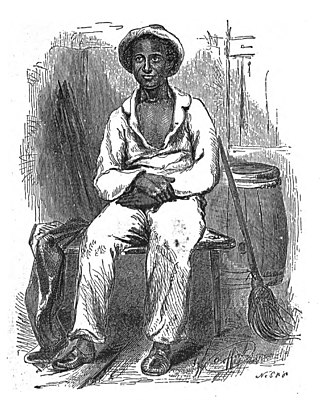
Solomon Northup was an American abolitionist and the primary author of the memoir Twelve Years a Slave. A free-born African American from New York, he was the son of a freed slave and a free woman of color. A farmer and a professional violinist, Northup had been a landowner in Washington County, New York. In 1841, he was offered a traveling musician's job and went to Washington, D.C. ; there he was drugged and kidnapped into slavery. He was shipped to New Orleans, purchased by a planter, and held as a slave for 12 years in the Red River region of Louisiana, mostly in Avoyelles Parish. He remained a slave until he met Samuel Bass, a Canadian working on his plantation who helped get word to New York, where state law provided aid to free New York citizens who had been kidnapped and sold into slavery. His family and friends enlisted the aid of the Governor of New York, Washington Hunt, and Northup regained his freedom on January 3, 1853.
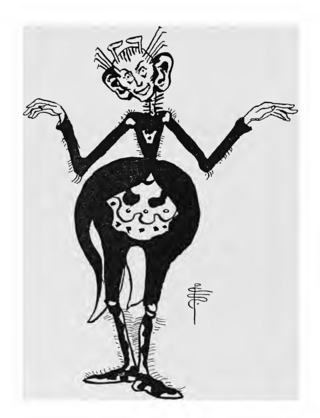
Anansi or Ananse is an Akan folktale character associated with stories, wisdom, knowledge, and trickery, most commonly depicted as a spider, in Akan folklore. Taking the role of a trickster, he is also one of the most important characters of West African, African American and West Indian folklore. Originating in Ghana, these spider tales were transmitted to the Caribbean by way of the transatlantic slave trade.
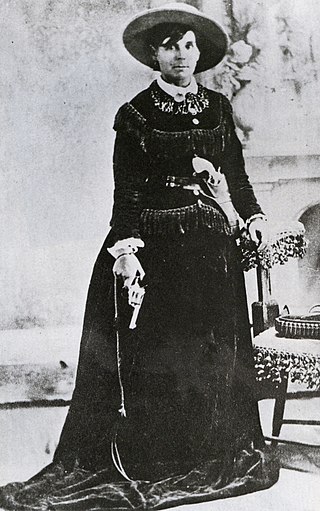
Myra Maybelle Shirley Reed Starr, better known as Belle Starr, was an American outlaw who gained national notoriety after her violent death.

Crazy Horse was a Lakota war leader of the Oglala band in the 19th century. He took up arms against the United States federal government to fight against encroachment by White American settlers on Native American territory and to preserve the traditional way of life of the Lakota people. His participation in several famous battles of the Black Hills War on the northern Great Plains, among them the Fetterman Fight in 1866, in which he acted as a decoy, and the Battle of the Little Bighorn in 1876, in which he led a war party to victory, earned him great respect from both his enemies and his own people.

Pleasant Hill, Kentucky, USA, is the site of a Shaker religious community that was active from 1805 to 1910. Following a preservationist effort that began in 1961, the site, now a National Historic Landmark, has become a popular tourist destination.

The Black Seminoles, or Afro-Seminoles, are an ethnic group of mixed Native American and African origin associated with the Seminole people in Florida and Oklahoma. They are mostly blood descendants of the Seminole people, free Africans, and escaped former slaves, who allied with Seminole groups in Spanish Florida. Many have Seminole lineage, but due to the stigma of having mixed origin, they have all been categorized as slaves or freedmen in the past.

Spotted Tail was a Sichangu Lakota tribal chief. Famed as a great warrior since his youth, warring on Ute, Pawnee and Absaroke (“Crow”), and having taken a leading part in the Grattan Massacre, he led his warriors in the Colorado and Platte River uprising after the massacre performed by John M. Chivington's Colorado Volunteers on the peaceful Cheyenne and Arapaho camping on Sand Creek, but declined to participate in Red Cloud's War.

Jacob Hamblin was a Western pioneer, a missionary for the Church of Jesus Christ of Latter-day Saints, and a diplomat to various Native American tribes of the Southwest and Great Basin. He aided European-American settlement of large areas of southern Utah and northern Arizona, where he was seen as an honest broker between Latter-day Saint settlers and the Natives. He is sometimes referred to as the "Buckskin Apostle", or the "Apostle to the Lamanites". In 1958, he was inducted into the Hall of Great Westerners of the National Cowboy & Western Heritage Museum.
Dustin "Dusty" Donovan is a fictional character on CBS's daytime drama As the World Turns. He was recently portrayed by Grayson McCouch from February 18, 2003, to January 18, 2008. McCouch returned to the role on September 24, 2008.
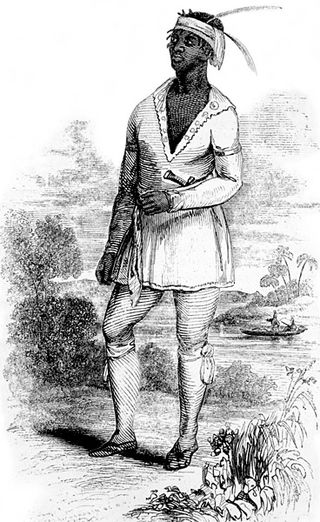
John Horse, also known as Juan Caballo, Juan Cavallo, John Cowaya and Gopher John, was a man of mixed African and Seminole ancestry who fought alongside the Seminoles in the Second Seminole War in Florida. He rose to prominence in the third year of what was to become a seven-year war when the first generation of Black Seminole leaders was largely decimated and the primary Seminole war chief, Osceola, fell into the hands of the American military commander, General Thomas Sydney Jesup.

Pushing the Bear is a historical novel by Diane Glancy which explores the lives of the Cherokee in 1838/39 during their forced removal from their land along the Trail of Tears in the United States. The book was published in 1996 by Harcourt.
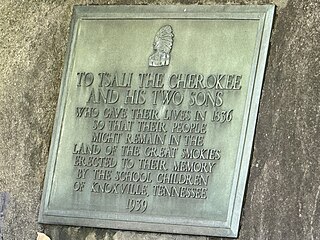
Tsali was a noted leader of the Cherokee during two different periods of the history of the tribe. As a young man, Tsali joined the Chickamauga faction of the Cherokee in the late 18th century, and became a leader in the fight against the American frontiersmen and their constant expansion into tribal lands. Later In 1812, he became known as The Prophet, and urged the Cherokee to ally with the Shawnee warrior, Tecumseh, in war against the Americans. Two decades later, in what seemed a fulfilment of his earlier prophecy, he resisted the forced removal of the Native Americans from their mountainous, western North Carolina towns, and as a result, a large following of like-minded Cherokee gathered to him. Following Tsali's martyrdom, the three hundred fugitive followers of his that remained free after his sacrifice became the forebears of some 14,000 registered members of the Eastern Band of the Cherokee Indians living today in the Qualla Boundary.
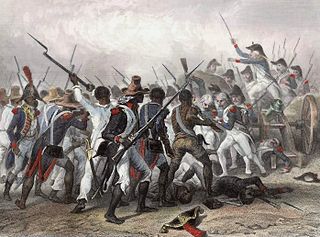
The 1842 Slave Revolt in the Cherokee Nation was the largest escape of a group of slaves to occur in the Cherokee Nation, in what was then Indian Territory. The slave revolt started on November 15, 1842, when a group of 20 African-Americans enslaved by the Cherokee escaped and tried to reach Mexico, where slavery had been abolished in 1829. Along their way south, they were joined by 15 slaves escaping from the Creek Nation in Indian Territory.
Fanny Kelly was a North American pioneer woman captured by the Sioux and freed five months later. She later wrote a book about her experiences called Narrative of My Captivity among the Sioux Indians in 1871.

Flying Hawk, also known as Moses Flying Hawk, was an Oglala Lakota warrior, historian, educator and philosopher. Flying Hawk's life chronicles the history of the Oglala Lakota people through the 19th and early 20th centuries, as he fought to deflect the worst effects of white rule; educate his people and preserve sacred Oglala Lakota land and heritage.

The Lost Stories is the eleventh and penultimate book in the series Ranger's Apprentice by Australian author John Flanagan. It is a collection of "lost" tales that fill in the gaps between novels.
The Battle of Platte Bridge, also called the Battle of Platte Bridge Station, on July 26, 1865, was the culmination of a summer offensive by the Lakota Sioux and Cheyenne Indians against the United States army. In May and June the Indians raided army outposts and stagecoach stations over a wide swath of Wyoming and Montana. In July, they assembled a large army, estimated by Cheyenne warrior George Bent to number 3,000 warriors, and descended upon Platte Bridge. The bridge, across the North Platte River near present-day Casper, Wyoming, was guarded by 120 soldiers. In an engagement near the bridge, and another against a wagon train guarded by 28 soldiers a few miles away, the Indians killed 29 soldiers while also suffering at least eight dead.

Sibú is the primary deity in the Talamancan mythology of Costa Rica. He is the creator of Earth and humanity, god of wisdom, values, and indigenous customs. He is called Sibú by the Bribri and Cabécar, Sibö by the Teribe, and Zipoh by the Boruca.

The history of slavery in Oklahoma began in the 1830s with the five Native American nations in the area: Cherokee, Chickasaw, Choctaw, Creek, and Seminole. Slavery within these Native American nations began simply by placing a lower status on them than their master. The slavery in these tribes varied in style, being specifically different from American slavery. Slavery in the area continued to grow for many years, even throughout the entirety of the Civil War. The growth was significant, slaves making up a portion of the population in the new Indian territory. Slavery ended in the Oklahoma area with the completion of the Civil War. Treaties were made with the nations regarding citizenship and slavery for African Americans. The repercussions of slavery that followed greatly affected the state, with prominent racial issues.

Mae Louise Miller was an American woman who was kept in modern-day slavery, known as peonage, near Gillsburg, Mississippi and Kentwood, Louisiana until her family achieved freedom in early 1961.
















